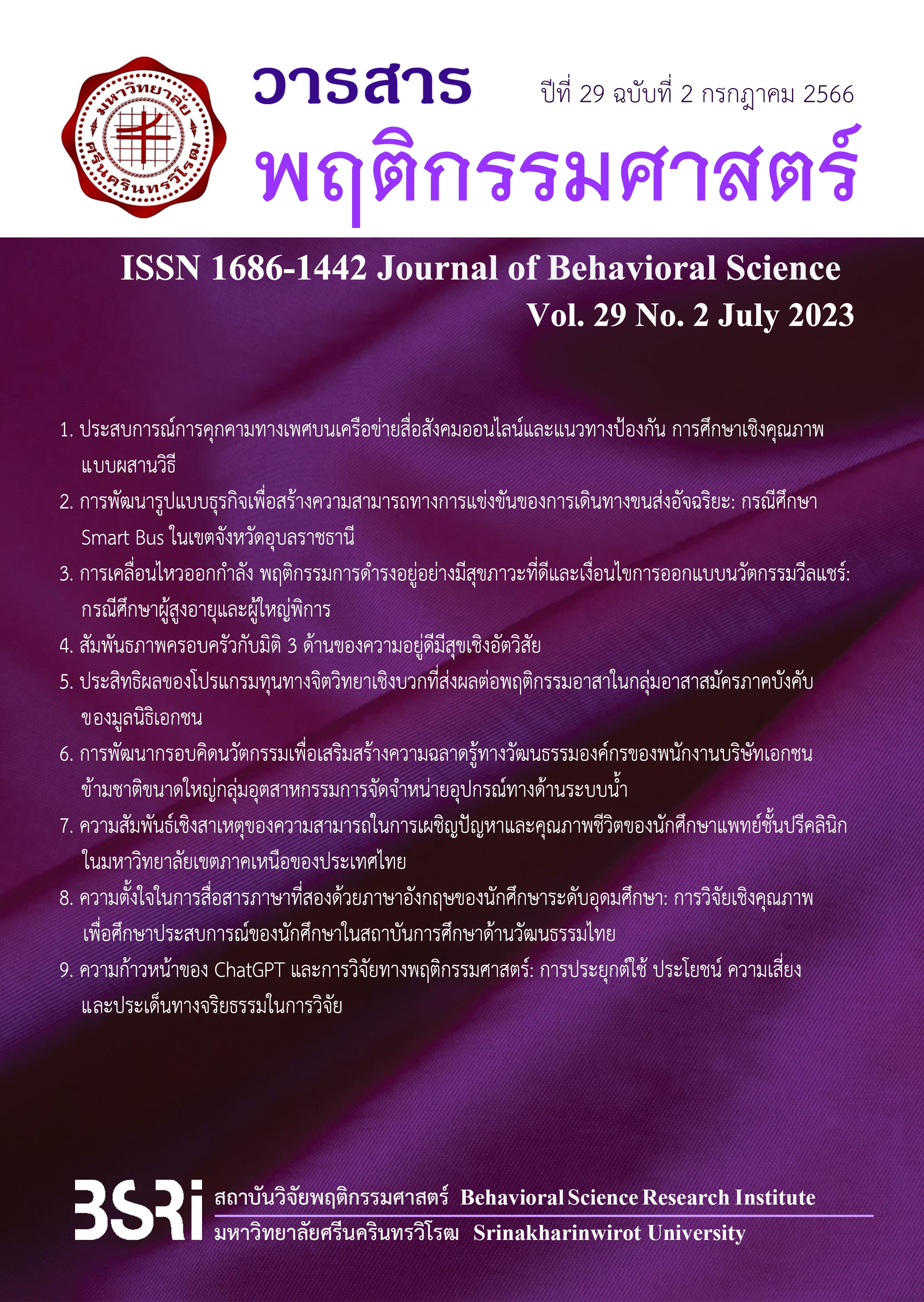The Development of Innovative Mindset for Enhancing Organization Culture Literacy of Employees in the Large Private Multinational Water Solution Company Sector
Keywords:
Innovative mindset, Organization culture literacy, Employee, Private multinational companyAbstract
This research was a mixed method research. The purposes of this research were 1) to study of organization culture literacy of employee in the large private multinational water solution company sector, 2) to develop innovative mindset for enhancing organization culture literacy, and 3) to study the effect of innovative mindset for enhancing organization culture literacy of employees. The population of this study was 101 employees of the large private multinational water solution company sector. The sample included two groups; the first group of organization culture literacy study consisted of 81 employees stratified selected from the population. The second group was purposely selected from the first group. This group consisted of 40 employees whose organization culture literacy scores were lower than fifty percentiles. They were then randomly assigned into 2 groups, classified as an experimental group and a control group, 20 persons in each group. The experimental group participated in the innovative mindset while the control group did not receive the innovative mindset and engaged in ordinary work. The research instrument were 1) the scale of organization culture literacy and 2) the innovation mindset for enhancing organization culture literacy. The quantitative data analyses were mean, standard deviation, Normality test, One-Way ANOVA with Repeated measure, Two-Way ANOVA with Repeated measure, and the qualitative data analysis was focus-group discussion. The results of the study were 1) the organization culture literacy of 81 employees revealed high with average score of 39.97 (39.97±8.24), 2) the innovative mindset was developed by applying psychological concepts: future orientation, holistic reflection, and design thinking and 3) post-test and follow-up of the organization culture literacy of the experimental group were significantly higher than pretest at the .01 level (F=54.226, p<.01) and significantly higher than that of the control group at .01 level (F=194.761, p<.01)
Downloads
References
Alwi, M. N. R. (2018). Boosting Innovative Behaviour Through Innovative Mindset: A Conceptual Model. The European Proceedings of Social & Behavioural Sciences, 289-296.
Bandura, A. (1986). Social Foundation of Thought and Action: A Social Cognitive Theory. Prentice-Hall.
Bass, J., Sidebotham, M., Sweet, L., & Creedy, D. K. (2021). Development of a tool to measure holistic reflection in midwifery students and midwives. Women and Birth, 35(5), 502-511.
Brown, T. (2013). Design Thinking. Harvard Business Review, 86(6), 84-92.
Chaijaroen, S. (2007). Study the thinking potential of learners who learn from learning innovation that promotes thinking potential [Unpublished Research project in the category of general grants, Khon Kaen University]. Khon Kaen University.
Chitakornkijsilp, P. (2005). International business and social culture differences. NIDA Development Journal, 45(2), 89-126.
Denison, D. R. (1990). Corporate Culture and organizational Effectiveness. John Wiley & Son.
Greenberg, J., & Baron, R. A. (2003). Behavior in organizations: Understanding and managing the human side of Work (8th ed.). Pearson Education.
Nato, H. (2009). Communication Skill for Heterogeneous Group – How this ever more important skill can be developed in the future. Quarterly Journal of Public Policy & Management, 2, 115-126.
Hodgetts, R. M., & Luthans, F. (2003). International Management Culture, Strategy and Behavior. McGraw-Hill.
Khammanee, T. (2018). Teaching Sciences knowledge for an effective learning process. Chulalongkorn University.
Mischel, W. (1974). Self-control Introduction to personality (3th ed.). Holt - Rinebart and Winston.
Office of the Royal Society. (2019). Dictionary of contemporary education: literacy. Arunkanpim.
Panich, V. (2015). Create learning for student in the 21st century. Journal of education and innovative learning, 1(2), 3-14.
Panpradub, S. (2022). A Paradigm for Academic Administration of Basic Education School in Disruption Period [Doctoral dissertation, Silapakorn University]. Silpakorn University. http://ithesis-ir.su.ac.th/dspace/handle/123456789/4105
Petchphrom, N. (2019). Organizational culture and quality of work life affecting work efficiency of employees of Thailand Post Company Limited [Master’s Thesis, Rajamangala University of Technology Thanyaburi]. Rajamangala University of Technology Thanyaburi repository, http://www.repository.rmutt.ac.th/xmlui/handle/123456789/3748
Robin, S. P., & Judge T. A. (2015). Organization Behavior (16th ed.). Pearson Education.
Sidhu, I., Goubet, J.-E., & Xia, Y. (2016). Measurement of innovation mindset. IEEE ICE TEMS Norway.
Simon, A. (2009). Understanding the Natural and Artificial Worlds. In H. B. Clark, D. E. (Ed.), Design Studies: A Reader. Berg.
Siriyarn, W., Charoensira, W., & Kenabhum, S. (2017). The Innovation Organization: The New
Alternative for 21st Century Development. Information Journal, 24(2), 72-80.
UNESCO. (2005). Education for all for life. France: United Nations Educational, Scientific and Cultural Organization.
Youngsuksathaporn, P. (2016). Creating an Innovation Culture Productivity World Journal, 21(120), 55-61.
Wigfield, A., & Eccles, J. S. (2000). Expectancy–value theory of achievement motivation. Contemporary educational psychology, 25(1), 68-81.
Downloads
Published
How to Cite
Issue
Section
License
Copyright (c) 2023 Warasan Phuettikammasat

This work is licensed under a Creative Commons Attribution-NonCommercial-NoDerivatives 4.0 International License.
Behavioral Science Research Institute, SWU
114 Sukhumvit 23, Bangkok 10110, Thailand.
Tel.02-649-5000 # 17600



